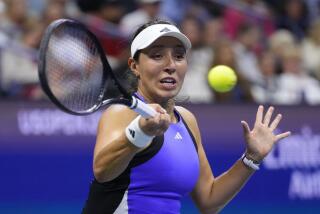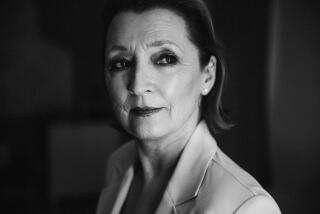She’s All Aflutter : Even After 22 Years, Navratilova Fights Nerves at Wimbledon
- Share via
WIMBLEDON, England — It is a tradition as old as some of the strands of ivy that drape the outer green walls of Wimbledon’s Centre Court, as old as some of the champagne they pour here at “tennis in an English garden.”
For the last 22 years--and you can set your tea time by it--Martina Navratilova, the greatest women’s player in the history of the game, has had a nasty case of the Pepto Bismols before almost every match. She gets nervous. Antsy. Whole flocks of Monarchs flutter away in her stomach.
It doesn’t matter whom
Navratilova plays. To her,everyone is the reincarnation of Chris Evert. Oh, God, something will go wrong. Somehow she will lose. She just knows it.
Saturday, as Navratilova waited anxiously to take the court for her third-round match against fellow American Linda Harvey-Wild, it happened again.
Navratilova, who has won an unprecedented nine women’s
singles titles at Wimbledon, had to be talked off the ledge.
Fretted Navratilova: Why was it taking so long for Great Britain’s Jeremy Bates to beat Germany’s Markus Zoecke? . . . What happens if it goes five sets, then what? . . . Sit here in this dressing room and go nuts?
On and on it went until Billie Jean King, a close friend, ordered her to relax.
“Look at the wall,” said King.
So Navratilova looked.
“What do you see?” King said.
Stripes.
Navratilova eventually calmed down. Bates beat Zoecke in four sets and Navratilova, her nerves at ease, beat Harvey-Wild in 59 minutes.
“In the now,” said the fourth-seeded Navratilova, explaining her mental approach. “What time is it? Now. Where are we? Here. That’s the whole ballgame. You can talk all sorts of psychological babble, but that’s basically the bottom line--stay in the moment.”
This is Navratilova’s 22nd and final Wimbledon as a singles player. At 37, she is the oldest competitor in the draw, a living legend if there ever was one. She has long since reached the point where victories no longer establish her greatness, but only confirm it.
Fred Perry, the last British player to win the men’s singles championship, once described his induction into the Tennis Hall of Fame as “being embalmed while ostensibly still alive.” Navratilova knows the feeling. Here she is, alive and kicking as Wimbledon’s fortnight continues into today’s round of 16, and all everyone wants to talk about is her farewell tour.
“Why am I retiring?” said Navratilova, repeating the question asked so many times since her announcement. “I just feel it’s time. I had a longer run than I ever expected. I’m grateful for that.”
Navratilova isn’t interested in defining her tennis legacy--at least not now, she isn’t. She has more important things to do, like play No. 17-seeded Helena Sukova in the fourth round.
For someone so organized (on her personal computer, she keeps, among other things, a tennis diary, a catalogue of dreams, scouting reports, a copy of the March on Washington speech, a list of vegetarian restaurants around the world, vet records for her pets), Navratilova was an absolute wreck at tournament’s beginning. She had lasted only one round at the French Open and then struggled in a warm-up tournament at Eastbourne. On grass, no less.
Navratilova was in the moment, all right, and the moment was making her tighter than a newly strung Yonex.
“I look at her and I just see her being locked up inside,” said Pam Shriver, a former doubles partner who won each of the four Grand Slam titles with Navratilova. “That’s why she’s not moving well. I don’t think she’s lost that much speed, if she would just kind of like let herself go a bit.”
Navratilova beat Claire Taylor in the first round, but it wasn’t anything to write home to Aspen about. Then she defeated Sandra Cecchini, but Navratilova still didn’t look right.
Shriver said her friend looked too “mechanical,” too worried about making her last Wimbledon memorable.
“I still feel like she can snap out of it,” Shriver said, “and what better place to snap out of it than some place where she’s had her finest moments, and on a surface that she knows. She knows she’s the best grass player in the draw, bar none. If I had to bet on somebody, I’d bet on her. But I’m just not going to empty my wallet.”
It was against Harvey-Wild that Navratilova began to resemble the player that Shriver (and everyone else) remembered. She lost only three points on serve in the first set. She volleyed well. She no longer played as if run by battery.
The spell of Wimbledon had taken hold, the same spell that had inspired her in 1978, when she beat Evert for her first singles championship at the All England Lawn Tennis Club, and again in 1979, 1982, 1983, 1984, 1985, 1986, 1987 and 1990--all title years.
“She’s really happy for the first time since January,” King said. “Her heart’s in it.”
Said Navratilova: “I’m really starting to relax and enjoy myself. . . . I was hoping that Wimbledon itself would just take over and it has. So I’m rising to the occasion I think, rather than wilting from it.”
There have been distractions, however. Saturday, she had a newspaper photographer ring the doorbell of her rental house at 8 a.m. But it happened this year, with the photographer telling Navratilova, “The boss told me to ring the doorbell at 6, but I waited until 8.”
The whole incident reminded her of the time tabloid photographers scaled a neighbor’s garage roof and tried taking photos of Navratilova through the kitchen window. “I look up and there’s a guy on the roof,” Navratilova said. “Get a life!”
Navratilova plans to do that very thing at year’s end. She already has written a murder mystery. She talks about going to Africa and living with the Bushmen for a year. She sees herself exploring the United States. “I’ll start with the Grand Canyon and go from there,” she said.
But today--in the all-important now--Navratilova has a match to play on Centre Court.
Sukova has beaten her before in Grand Slam events. They share the same homeland, the former Czechoslovakia, and have been doubles partners. According to Shriver, Sukova is the first true serve-and-volley player Navratilova will have faced in the tournament. There will be pressure. Lots of it.
A loss wouldn’t be entirely unexpected. But if it were up to Navratilova and to the Wimbledon fans who have crammed every seat to watch her play, there would be no farewell until Saturday, the day of the women’s final.
More to Read
Go beyond the scoreboard
Get the latest on L.A.'s teams in the daily Sports Report newsletter.
You may occasionally receive promotional content from the Los Angeles Times.










